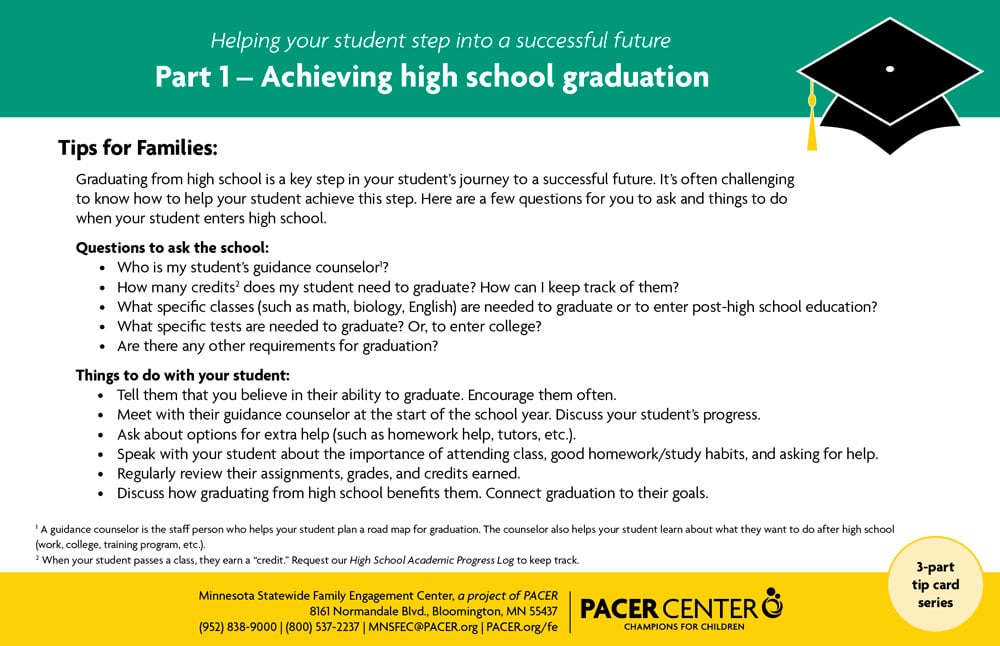
Supporting Your Student at Home
There are many ways that families can support their students outside of school. Traditionally, parent involvement at home consisted of helping children do their homework or reading. While these supports are important, we know that there are many ways that families support their child’s education at home.
These range from meeting a child’s basic needs, such as sleep and nutrition, to interacting with their child through conversation and storytelling, to setting expectations around attendance, homework, even education or career goals. All these activities have value and contribute to student success. Here are some additional resources for families and educators about the many ways that parent support their student’s success outside of school.
Resources for Parents
 Graduation Tip Cards: Helping Students Step into a Successful Future
Graduation Tip Cards: Helping Students Step into a Successful Future
This set of three laminated tip cards will assist families and school staff to support students in achieving high school graduation while planning for their future. The cards have questions to ask and tasks to do from the first day of high school to the graduation ceremony and beyond. Special emphasis on culturally diverse families. One side is written for families; the other side is for school staff. To order, email [email protected].- K is for Kindergarten...How to Help Your Child Be Ready
Kindergarten is a big step in your child’s life. As your child’s first teacher, you do a lot to make starting school a positive adventure. This booklet offers ideas on how to help your child prepare for school. - Tips to Support Shared Reading
Shared reading occurs when a child and a parent look at, read and talk about a book together. This handout provides shared reading strategies and benefits, as well as tips for motivating older readers. - Parents with High Expectations Promising Practices: Helping Your Child Read and Understand
Being a “good reader” means not only reading the words, but understanding them. This handout discusses the different aspects of reading and how families can encourage their student to read more, improving their reading skills. - Teach Your Child Key Homework Skills
How to help your child learn key homework and organizational skills. - School Attendance
Children don’t do as well in school when they frequently miss part of or an entire school day. You can help your child succeed in school by understanding how schools define absences and ways to support your child’s school attendance. - Mental Health and School Avoidance: What Parents Need to Know
For some children and teens with anxiety disorders, depression, or other mental health diagnoses, school can be overwhelming. They may frequently struggle to get to school, stay at school, or be engaged in classroom activities. This handout helps families identify school avoidance behaviors and provides advise about what they can do to address them. It also contains information about school absence policies and truancy. - Tools to Help your Child De-Stress
This workshop features apps that can help your child deal with stressors related to school, friends, and life. These tools can be used on a cell phone or computer. Access the handout for a list of all the apps mentioned in the workshop. - Ways to Help Your Teen Stay Organized
Does your teen struggle with keeping track of their schoolwork, managing their time, and staying on-task? Learn about technologies and strategies that can help middle and secondary students (grades 7 – 12) develop executive functioning skills. This Zoom webinar is designed for families and professionals and addresses skills for all students, including those with disabilities. - Let's Talk About STEAM Education: A Discussion for Families
This webinar addresses the topic of STEAM (Science, Technology, Engineering, Arts, and Math) education. Panelists discuss the importance of this kind of learning and how their organization helps families “do” STEAM with their kids. Staff from PACER’s Simon Technology Center also discuss the resources and specialized training they offer to children and adults with disabilities.
